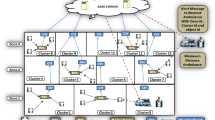Abstract
Wireless Sensor Network (WSN) plays a significant role in smart offices/workplaces and academic research nowadays. Due to the vast range of technologies research is being conducted in the domain such as environmental monitoring, human safety, military operations, intelligent remote monitoring, shopping malls, smart complex, healthcare etc. Clustering is a technique through which the efficiency of network is enhanced. Two Stage Energy Efficient Routing Protocol (TS-EERP) is proposed, which divides the network into different levels. Increasing the number of Cluster Head (CH) nodes at various levels improves the Residual Energy (RE) of cluster nodes/nodes. The aim of the paper is to develop an efficient CH selection mechanism based on maximum RE of Sensor Node (SN) and minimum Base Station (BS) distance. The proposed protocol works in two steps as follows: The data is collected from smart offices in the first step and from residential buildings in the next step. The collected data is aggregated by the Cluster head(s) and transmit to the BS in the Internet of Things (IoT) based network. The simulation performance of the proposed protocol improves the lifetime of the network compared to the SEP protocol.
Access this chapter
Tax calculation will be finalised at checkout
Purchases are for personal use only
Similar content being viewed by others
References
Chauhan, J., Goswami, P.: An integrated metaheuristic technique-based energy aware clustering protocol for Internet of Things based smart classroom. Mod. Phys. Lett. B 34(22), 2050360 (2020)
Paunikar, V.L., et al.: A user authentication scheme of Iot devices using blockchain-enabled fog nodes. Int. J. All Res. Writ. 1(11), 19–22 (2020)
Narayan, V., Daniel, A.K.: Multi-tier cluster based smart farming using wireless sensor network. In: 2020 5th International Conference on Computing, Communication and Security (ICCCS). IEEE (2020)
Narayan, V., Daniel, A.K.: A novel approach for cluster head selection using trust function in WSN. Scalable Comput. Pract. Exp. 22(1), 1–13 (2021)
Chaturvedi, P., Daniel, A.K.: A hybrid scheduling protocol for target coverage based on trust evaluation for wireless sensor networks. In: IAENG Int. J. Comput. Sci. 44(1) (2017)
Atzori, L., Iera, A., Morabito, G.: Understanding the Internet of Things: definition, potentials, and societal role of a fast-evolving paradigm. Ad Hoc Netw. 56, 122–140 (2017)
Chaturvedi, P., Daniel, A.K.: A novel approach for target coverage in wireless sensor networks based on network coding. In: Ray, K., Sharma, T.K., Rawat, S., Saini, R.K., Bandyopadhyay, A. (eds.) Soft Computing: Theories and Applications. AISC, vol. 742, pp. 303–310. Springer, Singapore (2019). https://doi.org/10.1007/978-981-13-0589-4_28
Bhagat, A., Geetha, G.: Optimization of LEACH for developing effective energy-efficient protocol in WSN. In: Khanna, A., Gupta, D., Bhattacharyya, S., Snasel, V., Platos, J., Hassanien, A.E. (eds.) International conference on innovative computing and communications. AISC, vol. 1059, pp. 195–206. Springer, Singapore (2020). https://doi.org/10.1007/978-981-15-0324-5_17
Plageras, A.P., et al.: Efficient IoT-based sensor BIG Data collection–processing and analysis in smart buildings. Future Gener. Comput. Syst. 82, 349–357 (2018)
Harkare, A., Potdar, V., Mishra, A., Kekre, A., Harkare, H.: Methodology for implementation of building management system using IoT. In: Suma, V., Bouhmala, N., Wang, H. (eds.) Evolutionary Computing and Mobile Sustainable Networks. LNDECT, vol. 53, pp. 939–948. Springer, Singapore (2021). https://doi.org/10.1007/978-981-15-5258-8_86
Chugh, A., Panda, S.: Strengthening clustering through relay nodes in sensor networks. Procedia Comput. Sci. 132, 689–695 (2018)
Boubiche, D.E., Bilami, A.: HEEP (Hybrid Energy Efficiency Protocol) based on chain clustering. Int. J. Sensor Netw. 10(1–2), 25–35 (2011)
Kumar, S.A., Ilango, P., Dinesh, G.H.: A modified LEACH protocol for increasing lifetime of the wireless sensor network. Cybern. Inf. Technol. 16(3), 154–164 (2016)
Neto, J.H.B., et al.: MH-LEACH: a distributed algorithm for multi-hop communication in wireless sensor networks. In: ICN 2014, pp. 55–61 (2014)
Khan, M.K., et al.: Hierarchical routing protocols for wireless sensor networks: functional and performance analysis. J. Sens. (2021)
Smaragdakis, G., Matta, I., Bestavros, A.: SEP: a stable election protocol for clustered heterogeneous wireless sensor networks. In: Second International Workshop on Sensor and Actor Network Protocols and Applications (SANPA 2004), vol. 3 (2004)
Islam, M.M., Matin, M.A., Mondol, T.K.: Extended Stable Election Protocol (SEP) for three-level hierarchical clustered heterogeneous WSN, pp. 43–43 (2012)
Kaur, H., Sharma, H., Manu, G.: Multi-hop Routing SEP (MR-SEP) for clustering in wireless sensor network. Int. J. Eng. Technol. Manage. Appl. Sci. 2(3), 54–65 (2014)
Yang, M., Yang, D., Huang, C.: An improved HEED clustering algorithm for wireless sensor network. J. Chongqing Univ. 35(8), 101–106 (2012). Chongqing Daxue Xuebao (Ziran Kexue Ban)
Meddah, M., Haddad, R., Ezzedine, T.: An energy-efficient and density control clustering algorithm for wireless sensor network. In: 2017 13th International Wireless Communications and Mobile Computing Conference (IWCMC). IEEE (2017)
Author information
Authors and Affiliations
Corresponding author
Editor information
Editors and Affiliations
Rights and permissions
Copyright information
© 2022 ICST Institute for Computer Sciences, Social Informatics and Telecommunications Engineering
About this paper
Cite this paper
Narayan, V., Daniel, A.K. (2022). IOT Based Sensor Monitoring System for Smart Complex and Shopping Malls. In: Calafate, C.T., Chen, X., Wu, Y. (eds) Mobile Networks and Management. MONAMI 2021. Lecture Notes of the Institute for Computer Sciences, Social Informatics and Telecommunications Engineering, vol 418. Springer, Cham. https://doi.org/10.1007/978-3-030-94763-7_26
Download citation
DOI: https://doi.org/10.1007/978-3-030-94763-7_26
Published:
Publisher Name: Springer, Cham
Print ISBN: 978-3-030-94762-0
Online ISBN: 978-3-030-94763-7
eBook Packages: Computer ScienceComputer Science (R0)




